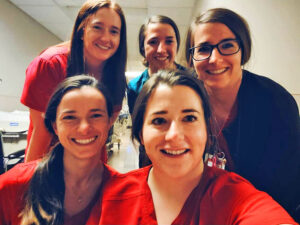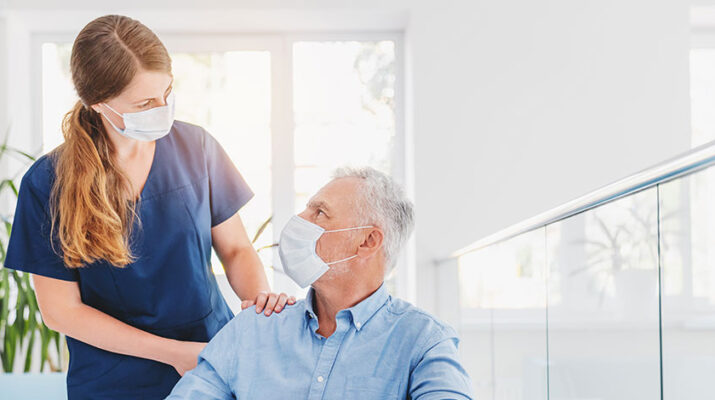Sister nurses: Five sisters all working locally in the medical field
By Megan Plete Postol

Five Central New York sisters have all found their calling caring for others.
The women are originally from Remsen, northern Oneida County, five of the eight daughters (and 14 siblings in total) of the Roberts family.
Alexandra (Roberts) Knopic, Cassandra (Roberts) Doolen, Siena Roberts and Theresa Roberts have all been working in the field as registered nurses for a few years.
Jennalynn Roberts, a soon-to-be graduate nurse, started this past November as a nurse tech and officially graduates in May.
Cassandra was the first to start in 2013 as a nurse tech (certified nursing assistant, CNA) and became an registered in 2014, followed by her twin, Alexandra, as a ward clerk/nurse tech while she attended nursing school, and she became an RN in 2017.
The next to start in the field was Siena. She, too, started work as a CNA while in college. In 2018 she earned her RN designation and has worked as a nurse at St. Elizabeth’s in Utica since. She is currently studying at New York Chiropractic College for a master’s degree in applied clinical nutrition and is set to graduate.
Jennalynn started working at St Elizabeth’s Hospital in 2019 and already has a position secured as a graduated nurse.
The sisters have all been able to work together over the years at St. Elizabeth’s Hospital.
“I absolutely love working with my sisters,” Theresa Roberts said. “We help each other get through the day, during the good and tough times. When I first started out as a nurse it took me a while to really get into the swing of things. I struggled. Having my sisters there for me was huge. They toughened me up and guided me through my first year as a nurse. My sisters have made a huge impact on my nursing career and have helped me become the nurse I am. I don’t know what I would have done without my sisters starting out as a new nurse. It’s very difficult having to work a holiday or weekends and missing out on all the fun family activities; but when you are still spending it with family it makes it much better.”
Jennalynn, the last of the Roberts sisters to enter the medical field, admires her sisters and looks to them for guidance.
“Being the youngest sister to become a nurse, they have all been there to help support me along the way,” Jennalynn Roberts said. “If there was something they were able to show or teach me without hesitation they would be doing so. A lot of what I know has come from them. They all have been able to teach me so much. Seeing their compassion and how they care for patients makes me want to become a better nurse.”
Working through the COVID-19 pandemic has presented the sisters with many challenges.
“Working through COVID is something I’ll never forget,” Alexandra Knopic said. “When COVID first hit, our unit was shut down temporarily because we mainly took postoperative patients after their hip and knee replacements. We were floated to other units each day we came to work, and because of this we mainly worked on the COVID unit.
“In the beginning every day could be pretty overwhelming. What you did yesterday wasn’t something you were doing today. You were having to work with different people each day. It made it tough. The nurses had a lot on their plate. It was tough trying to get our jobs done, passing medications, our assessments, patient care, talking to families, our charting done and everything in between. Because we tried to limit the amount of staff being exposed to COVID we also had to become dietary, housekeeping, maintenance…you name it. The nurses were many times the only face patients would see during the day. With no visitors in the hospital it became pretty tough because you had to make sure you spent that extra time with your patient because they were alone and scared.
“The past year working as a floor nurse has been pretty draining. Almost every day you would leave work feeling defeated, feeling you didn’t, or couldn’t, do enough. You did what you could to get through the day. It was an awful feeling. The care you gave a few months before COVID was not the care that you could continue to give. It was heartbreaking. I will never forget the first patient I took care of that had COVID and didn’t make it. You are constantly thinking back on what you could have done differently in hopes of a different outcome. I think about this patient often.
“Many nurses were very lonely during COVID, no one understood what you were really going through each day. Having worked through this with my sisters, is something I will always be thankful for. You had someone there for you that really understood what you were going through mentally and physically each day.”
They strived to provide their patients with personalized care and compassion, which required some creativity because of the COVID-19 restrictions.
“Taking care of COVID patients was a challenge,” Theresa Roberts said. “Wanting to give the care I always give patients was just not possible. We had to limit our time in the rooms to decrease the amount of exposure possible. That meant there wasn’t much time for side conversations and getting to know them.
Having such a heavy assignment trying to find extra time for just one patient was hard. It was heart-breaking watching these patients go through this alone. I have had multiple patients of mine crying because they were so scared and lonely. There was a time I ended up just crying with my patient because I didn’t know what to say. I was so stressed and overwhelmed that when they cried I just broke out in tears with them. I couldn’t tell them it was going to be OK and things will get better because I didn’t even know if it was possible for things to get better, even for myself. I just told them I was so sorry. I couldn’t even give them hope.
“We were the only people that they were allowed to see during this scary time,” Theresa Roberts continued. “I became close with one of my patients and found out that they liked to hunt and fish. They were so lonely and sad sitting in their room quietly. I felt so awful seeing them like this. I had pictures on my phone of my boyfriend hunting and fishing with the big fish and deer he has gotten over the years. I put my phone in a Ziploc bag and showed the patient these pictures. The biggest reward being a nurse is making someone’s day better. Getting this patient to smile was one of the most rewarding times of my career as a nurse. The smile on their face when looking at the photos was what got me through the rest of my day.”
The sisters want to thank the community for all of the care packages of thanks they have received during the pandemic.
“We have received snacks, meals, thank you cards, candy, drinks and many other gifts from members of our community,” Cassandra Doolen said. “The appreciation does not go unnoticed. During these dark times the community has come together to take care of each other. Knowing how much we were appreciated by our community was very wonderful.”
All of the women agreed that nursing is both a difficult, and extremely rewarding, profession.
“Being a nurse has a lot of ups and downs,” Theresa Roberts said. “The majority of the time you feel defeated and exhausted. But, then you get that one patient that reminds you why you became a nurse in the first place. I take care of multiple patients that have fractures and total joint replacements, and getting them up after surgery and walking is one of my favorite things to do.”
Cassandra Doolen said that it takes a certain kind of person to be a great nurse.
“Skills can be learned and knowledge can be taught, but being a hardworking compassionate person can not,” Doolen said. “A patient needs a hand to hold, an ear that will listen and a heart that cares. Being compassionate and caring is so important in the nursing field.”
She is grateful to have her sisters to weather the ups and downs of her career with.
“It is truly a blessing to work alongside your sisters on a daily basis,” Doolen said. “We are very blessed to have each other.”

